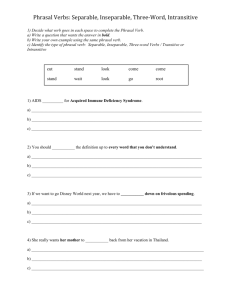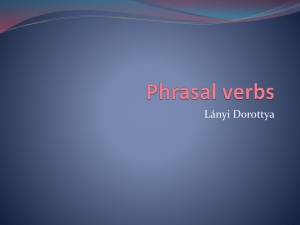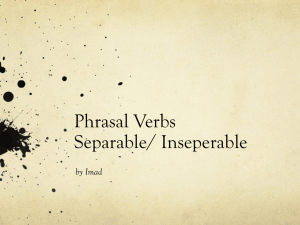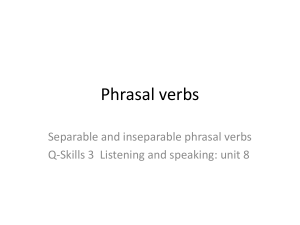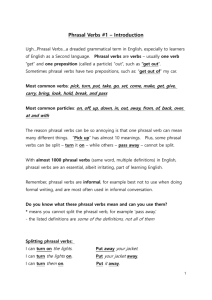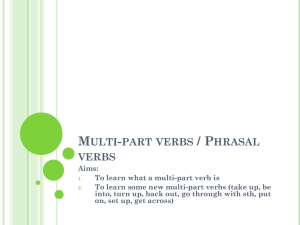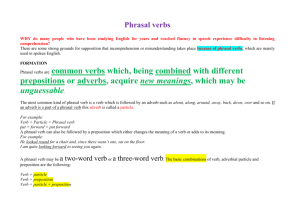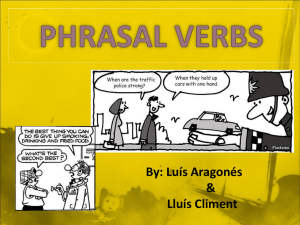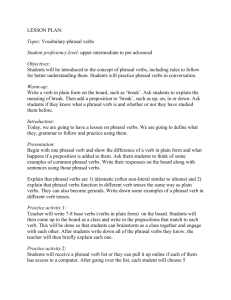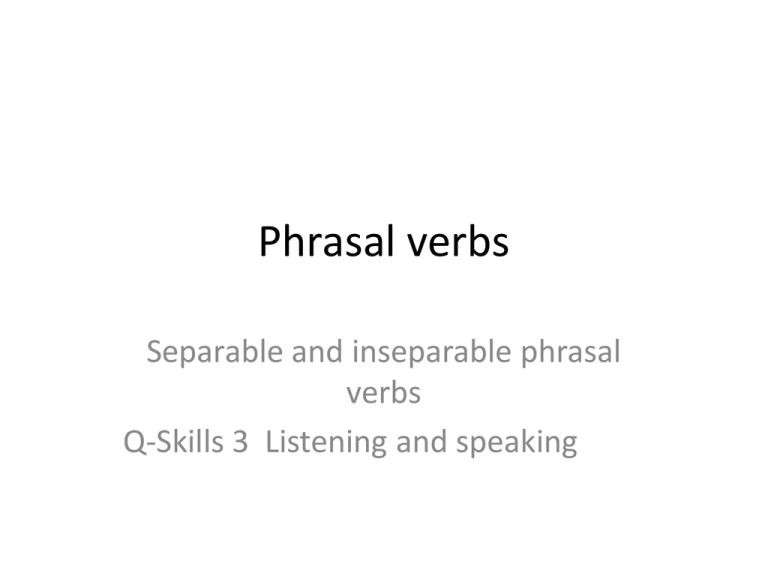
Phrasal verbs
Separable and inseparable phrasal
verbs
Q-Skills 3 Listening and speaking
References
• Scrivener, J., (2010)Teaching English Grammar: what to teach and how to
teach it, Macmillan Books for Teachers, Oxford
• Swan, M., ( 2005) Practical English Usage, Oxford University Press, New
York
• Fuchs, M., bonner, M., &Westheimer, M., (2006) Focus on Grammar: An
Integrated Approach, Pearson Longman new York
• www.onestopenglish.com
‘I’m a morning person’ !
• The alarm goes of at 4:45am. I wake up, lean over and turn off
the alarm. I get up quickly and go downstairs. I put on the
coffee. I go back upstairs and have a shower. I put on my
clothes and pray. When I come down stairs again I have my
first cup of coffee. Mmmmm! Then I have some toast and a
second cup of coffee. I wash my cup and tidy up the kitchen. I
take my bag and set off to work. It is 6:30am. I lock up the
house before I go. Sometimes I run to catch the bus. I get on
the bus and go for about half an hour. Then I get off the bus. I
go into work and “GOOD MORNING!” to my first class.
What do we call the verbs
highlighted in red?
Phrasal verbs/ multi-word verbs
Verb + one or more words = new meaning
pv = verb + particle ( preposition, adverb or both )
Phrasal verbs are informal
used in idioms
More common in everyday spoken language
Ex. Ahmed cut down on smoking.
Cut down ( in this context) = to do less of something.
Badriyah ran up the bill.
ran up =to increase something = negative meaning
You have to be very careful not to confuse phrasal verbs with prepositional
phrases.
In a phrasal verb the preposition goes with the verb
In a prepositional phrase the preposition goes with the noun phrase.
phrasal verb = Badriya ran up the bill
prepositional phrase =Badriyah ran up the hill
Phrasal verbs tend to be idiomatic= gives a different meaning.
Types of phrasal verbs
Transitive phrasal verbs
Intransitive phrasal verbs
•
• Intransitive the verb does not
have an object
•
Transitive means a verb is used with an
object.
Most phrasal verbs are transitive
•
•
This means that the object can come
after the verb
•
Mary turned on the radio.
•
turn on = make something work usually
electrical.
•
•
• Some pv are intransitive
• Nasser’s car broke down.
• broke down = stopped working
• I woke up at 4.45am.
The teacher passed out the homework.
passed out= to give, to distribute
• woke up = to awaken
.
Transitive phrasal verbs
Most phrasal verbs are transitive
Transitive means a verb is used with an object.
Mary turned on the radio.
turn on = make something work usually electrical.
The teacher passed out the homework.
passed out= to give, to distribute
Intransitive phrasal verbs
Intransitive the verb has no direct object
Nasser’s car broke down.
broke down = stopped working
I woke up at 4.45am.
woke up = to awaken
Separable phrasal verbs
• When phrasal verbs are transitive they can
usually be separated.
• It usually makes a better sentence
• When using a pronoun it is the only possible
way
√
Ali
switched
√
Ali
switched
the
radio
on
√
×
Ali
switched
it
on
Ali
switched
on
it
√
I
put
on
my
clothes
√
I
put
my
on
clothes
√
×
I
put
them
I
put
on
the radio
on
on
them
How multi-verbs are taught
Particle
Main verb
Usage (travel)
break off
go out
picked up
turn off
go against
broke down
set off
go ahead
check in
put off
go back
took off
cut off
go over
get off
take off
go without
slow down
wear off
go out
held up

